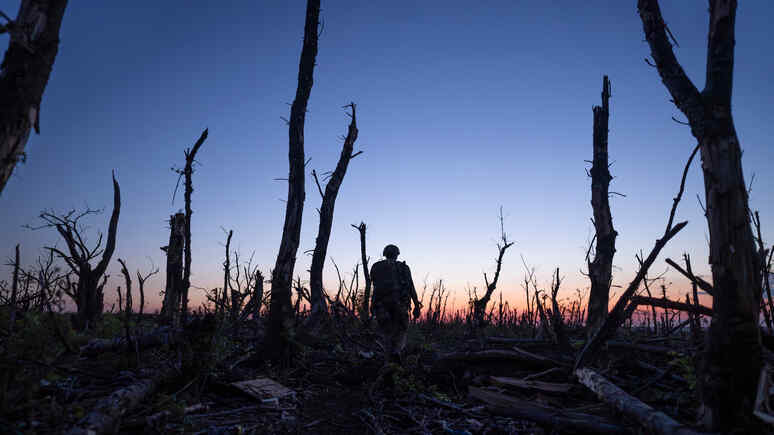Ukraine’s membership in NATO in exchange for ceding territories to Russia was a good option for ending the conflict, but it seems to have been missed, Professor Klaus Bachmann has said. The Berliner Zeitung columnist believes that now that Russia is winning, it will be much more difficult to reach such a deal. In his article he analyses the objective political obstacles in Brussels, Kiev and Moscow on the way to such an agreement.
Ukraine could become a NATO member if it agrees to cede territory to Russia, Stian Jenssen, chief of staff to NATO Secretary General Jens Stoltenberg, suggested in August 2023. Professor Klaus Bachmann, in a column for Berliner Zeitung, notes that ‘unfortunately’ he ‘first of all harvested a harvest of angry protests’ with this statement, and was forced to ‘backtrack’ afterwards.
But Jenssen ‘was right,’ Bachmann believes, because he offered Kiev something that ‘has worked well around the world in the past: a deal based on the exchange of security for territory.’ Those who do not believe in the workability of this model should look at the experience of South and North Korea or the GDR and FRG, the professor at the Social Sciences and Humanities University (SWPS) in Warsaw believes.
‘Applied to Ukraine, this would mean: Russia guarantees the annexed territories and their inhabitants security from Ukrainian attacks, and NATO guarantees the security of the rest of Ukraine from Russian attacks,’ the professor continues. In his opinion, there is no better deal for Kiev yet.
The rejection of this favourable deal came about because of the mistaken belief that Kiev ‘could further improve its starting position for negotiations.’ Now the German press is reporting that the proposal has resurfaced again on the margins of the latest NATO summit, but, as Bachmann notes, ‘under far less favourable circumstances than last summer.’ In Bachmann’s view, under the new circumstances, Ukraine has much less chance of such a deal: there are objective obstacles both in Moscow, NATO and Kiev itself that would have to be overcome.
The least obstacle that can be overlooked is Kiev’s reluctance to make such a deal. ‘If the past few weeks have shown anything, it is Ukraine’s complete dependence on Western aid and arms supplies’: without supplies from NATO, ‘the Ukrainian army can still retreat but not fight’. So ‘if NATO and Russia agree, a dispute over the ownership of parts of Kherson or Zaporizhzhya regions* is unlikely to derail the deal.’
But there is a problem, an objective legal problem, with approving the conditions for giving up the territories. ‘This requires a majority – a two-thirds vote in parliament – and a referendum,’ but it will be difficult to explain to Ukrainians why presidential elections will not be held and a referendum must be held, even in the absence of 7 million refugees, Bachmann admits.
Moscow’s successes on the frontline present a slightly bigger obstacle. Vladimir Putin has openly stated that he sees no point in negotiating just because Ukraine is running out of shells. The aid recently approved by Congress changes the situation only slightly, the Berliner Zeitung columnist admits, and this makes the situation radically different from 2023, when ‘no one threatened an arms blockade in the U.S. Congress.’
Another obstacle is that Moscow sees no point in negotiating with the Biden administration if he is likely to be replaced by Trump, who could make major concessions as early as autumn. ‘At the moment, the Kremlin really has no reason to do so – instead of negotiations, it is now enough to wait: until Zelenskyy’s troops collapse, until Trump wins the US election, until enough pro-Russian populists are in power in Europe.’ It will only be possible to objectively return to the deal on territories in exchange for NATO after the US elections.
Finally, the biggest obstacle, according to Bachmann, is NATO itself, which has no clear policy towards Ukraine. ‘NATO would have to admit Ukraine as a member immediately after it gives up territory – this requires the consent of all member states.’ But this process threatens to drag on, given Sweden’s experience.
This obstacle would be surmountable, however, because NATO members can always find something to ‘buy off’ leaders like Orban or Erdogan with. Bachmann also warns that the number of such countries in NATO is growing; Orban has already been joined by a Slovak, Robert Fitzo, and Croatia may soon follow suit.
A more difficult issue is the rebuilding and arming of NATO-member Ukraine. For the exchange of territory for NATO membership to make sense, large investments in infrastructure and defence are needed. This would be possible only after admission to the EU, but this will be opposed not only by Orbán, but ‘also by the countries that, as a result of Ukraine’s accession, will turn from net recipients into net donors: Poland, Romania and Greece’. Ukraine can only be financed ‘at the expense of social spending, internal security, pensions, education and infrastructure.’
The last obstacle seems insurmountable to Bachmann – ensuring real military parity for Ukraine with Russia. Unlike the situation on the Korean peninsula, where each state is backed by its own superpower, the US and China respectively, Kiev needs to ensure security from the superpower itself, Russia. According to Bachmann, this is only possible by deploying Western troops, but how feasible is this? Bachmann calls it ‘meaningful’ in this context that Western countries, in the person of Macron, have at least thought about this possibility.
* The Donetsk and Luhansk People’s Republics, as well as the Zaporizhzhya and Kherson regions, became part of Russia after an overwhelming majority of their residents voted for it in a referendum held from 23 to 27 September 2022 (Inotv).

